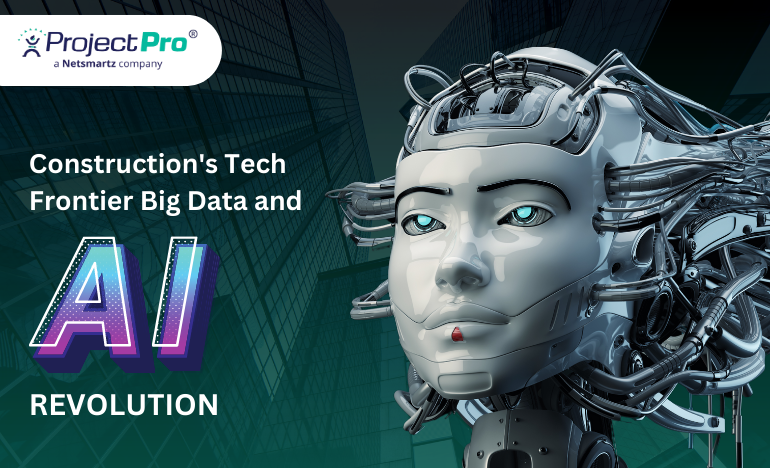Revolutionizing Construction with Big Data and AI: Building a Smarter Future

The construction industry has always been synonymous with hard hats, heavy machinery, and manual labor. However, a quiet revolution has occurred in recent years within this traditionally brick-and-mortar realm. Big Data and Artificial Intelligence (AI) are slowly but surely transforming the construction landscape, promising to enhance efficiency, reduce costs, improve safety, and revolutionize construction accounting project management. In this blog post, we will explore the fascinating world of Big Data and AI in construction, exploring their potential to reshape an industry that has long been associated with manual processes.
The Nexus of Big Data and AI in Construction
Big Data: In the construction industry, data is generated every second. The data includes project designs, schedules, cost estimates, materials specifications, equipment usage, weather patterns, etc. The challenge lies in managing this massive volume of data and extracting meaningful insights to drive informed decisions.
AI: Artificial Intelligence, on the other hand, refers to the capability of machines to simulate human intelligence. Machine learning, a subset of AI, enables systems to learn from data and improve their performance over time. By processing and analyzing vast amounts of data, AI algorithms can uncover patterns, predict outcomes, and provide recommendations.
Applications of Big Data and AI in Construction
Design and Planning: Big Data and AI assist architects and engineers in designing efficient, sustainable, and safe structures. By analyzing historical project data, AI systems can identify design patterns that lead to successful outcomes. This aids in optimizing layouts and materials and even predicting potential design flaws.
Risk Management: Construction projects are rife with uncertainties. Big Data and AI help mitigate risks by analyzing historical data to predict potential delays, cost overruns, or safety hazards. Project managers can make proactive decisions to prevent these issues.
Resource Allocation: Proper allocation of resources, be it materials, labor, or equipment, is critical in construction. AI algorithms can analyze project data to optimize resource allocation, reducing waste and maximizing efficiency.
Scheduling and Project Management: AI-driven systems can create and update project schedules based on real-time data, weather forecasts, and resource availability. In recent years, more construction accounting and project-based software like ProjectPro have been introduced. They ensure smoother project execution, minimize delays, and enhance overall project management.
Safety Monitoring: By analyzing data from sensors, wearables, and on-site cameras, AI can identify potential safety hazards and notify workers and supervisors in real-time. This technology contributes to a safer work environment.
Quality Control: AI-powered visual recognition systems can identify defects in construction materials and finished structures, ensuring quality standards are met. This reduces the need for manual inspections and speeds up the quality control process.
Benefits of Leveraging Big Data and AI
Enhanced Efficiency: Integrating Big Data and AI streamlines various construction processes, reducing time and effort. Greater efficiency translates to faster project completion and reduced operational costs.
Cost Savings: Predictive analytics enabled by these technologies help anticipate and prevent cost overruns, saving money in the long run.
Improved Decision-Making: AI-driven insights enable data-informed decisions, minimizing the risk of errors that arise from human judgment.
Greater Safety: Real-time monitoring and hazard prediction systems lead to safer working conditions and fewer accidents.
Sustainability: Data analytics aid in designing and constructing eco-friendly buildings by optimizing resource usage and minimizing waste.
Client Satisfaction: Timely completion, budget adherence, and enhanced quality contribute to happier clients.
Challenges and Future Directions
While the synergy between Big Data and AI holds immense potential, it's not without challenges. The construction industry faces obstacles such as data privacy concerns, integration of legacy systems, and resistance to change among employees. Moreover, the accuracy of AI predictions heavily relies on the quality of input data.
Looking ahead, advancements in data collection methods, sensor technologies, and AI algorithms will continue to enhance the capabilities of these technologies. Machine learning models will become more sophisticated, enabling them to handle complex scenarios and providing more accurate insights.
Summing Up
Ever since the introduction of Big Data and AI, the construction industry has been revolutionizing, empowering it to evolve beyond its traditional roots.
The benefits are far-reaching, from optimizing design and resource allocation to enhancing safety and quality. While challenges remain, the trajectory is clear: as technology advances, construction will become more efficient, sustainable, and innovative than ever before.
Embracing this transformation is an option and a necessity for staying competitive in the ever-evolving construction landscape. So, let’s not shy away from digital transformation and partner with the Dynamics Business Central powered construction accounting software solution provider – ProjectPro.







